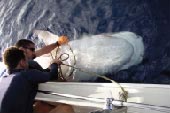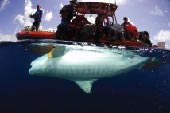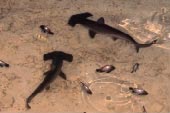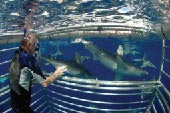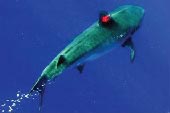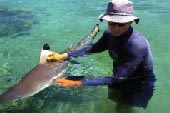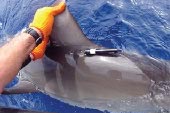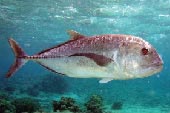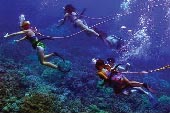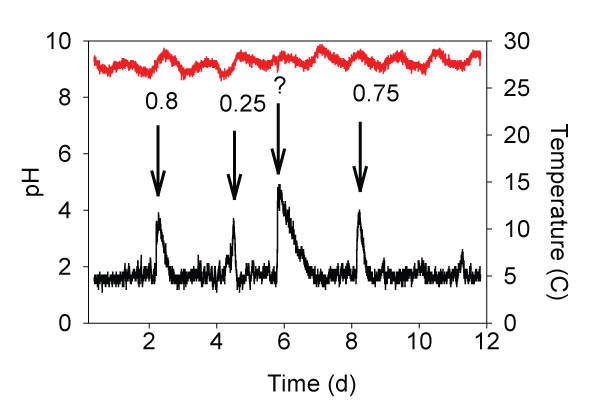The response of gastric pH and motility to feeding and
fasting in free swimming sharks |
| Principal Investigators: Yannis Papastamatiou & Kim Holland |
| |
| Project Overview |
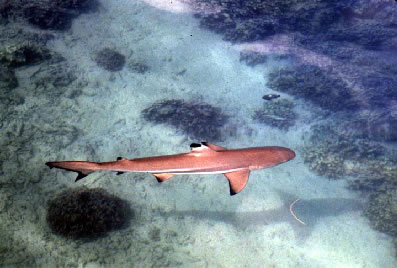
Figure 1. Blacktip reef shark (Carcharhinus melanopterus) |
Gastric digestion in sharks is responsible for the complete breakdown of whole prey items into semi-liquid chyme. The stomach accomplishes prey breakdown by the secretion of concentrated hydrochloric acid, protease enzymes (pepsin) and contractions of the stomach wall. By quantifying how the stomach responds to different meal types and sizes, and environmental conditions, we can improve optimal foraging models by predicting which behaviors the shark can use to optimize digestion. Furthermore, measurements of gastric digestion in the field can be used to determine when and where active digestion occurs in free-ranging individuals. We used data-loggers to measure pH, temperature and motility in free swimming blacktip reef sharks, Carcharhinus melanopterus, under semi-natural conditions. |
| |
| Research Questions |
We addressed the following specific questions:
- How does gastric pH and motility respond to feeding and periods of fasting?
- How does motility respond to different meal types, sizes and changes in water temperature?
- Are there any cyclical patterns in acid secretion and stomach contractions in free-swimming sharks?
|
| |
| Methods |
| We inserted data-loggers into the sharks stomach’s before releasing them to swim freely throughout the shark pond at HIMB. Sharks were fed meals of squid and fish over a 1 -2 week period, at a variety of meal sizes. We then removed the data-loggers and recovered the stored data. In subsequent experiments we used an ultrasonic pH transmitter. This device also measures stomach pH but transmits rather than stores the data. Transmitted stomach pH data are remotely recorded by a receiver equipped with a hydrophone that ‘listens’ to the underwater signal produced by the tag. |
| |
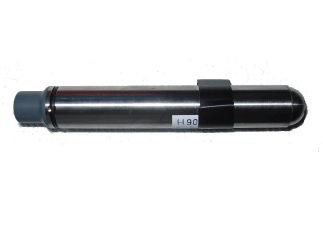
Figure 2. Stomach pH transmitter. |

Figure 3. A pH transmitter concealed inside a squid is inserted into the stomach of an anesthetised backtip reef shark. |
|
| |
| Results |
| Sharks secrete small amounts of acid even during long periods of fasting. A characteristic change in pH occurs, each time the shark feeds (Figure 4). After feeding there is a 7 -12 h period of reduced muscle activity, after which strong contractions occur. Meals of fish elicited stronger contractions than meals of squid, and contractions increased with increased water temperature. This suggests that it takes sharks longer to evacuate a meal of squid than a meal of fish. As meal size increased, muscle contractions also increased up until meal sizes of 1 % body weight (BW), after which larger meals actually caused a decrease in contractions. There were diel patterns in gastric motility with reduced contractions during the early morning, and increased contractions in the late afternoon. We predict that optimal digestion will occur if sharks consume meals at 1% BW, during periods of the day when water temperatures are lower. |
| |
|
| Figure 4. Continuous measurements of gastric pH and temperature in a free-swimming blacktip reef shark (Carcharhinus melanopterus). Lower black line is gastric pH, upper red line is gastric temperature. Data were obtained using a dual sensor pH/temperature transmitter. Arrows point to feeding events. Meal size is expressed as a percentage body weight. “?” indicates a meal of unknown size. |
| |
| Project Publications |
Papastamatiou YP, Meyer CG, Holland KN. 2008. A new acoustic pH transmitter for studying the feeding habits of free-ranging sharks. Aquatic Living Resources. 20:287–290 |
| Papastamatiou Y, S Purkis, K Holland. 2007. The response of gastric pH and motility to fasting and feeding in free-swimming blacktip reef sharks, Carcharhinus melanopterus. Journal of Experimental Marine Biology and Ecology 345: 129-140 |
| |
| |

